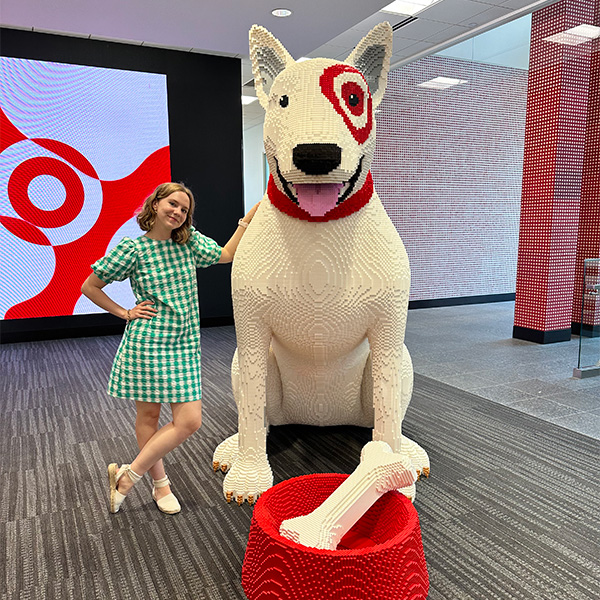Your Everything Guide to Landing an Internship was originally published by BU Today
Our occasional series helps you make your first career moves
During the summer after freshman year, Tabitha Fortner interned at a nonprofit and after sophomore year at a venture fund firm. Both were fine experiences, but she left knowing she didn’t want to pursue either of those fields after graduation. And that’s OK.

Last summer, Fortner (CAS’24) narrowed her focus and applied to the Liberty Mutual Insurance analyst development program. She was accepted, even though many of the other interns had more technical skills than she did. But that only upped her drive.
“My bosses said they loved how I was open and willing to learn everything,” Fortner says. “And I actually found it really helpful that Liberty has workshops on [software] programs that I had no experience in, so I took those.” Her hard work paid off. At the end of the internship, Fortner was offered a full-time position with Liberty Mutual, and she’ll start after she graduates this May.
Internships are stepping stones to help you get the job you ultimately want. In the best-case scenario, they can even lead to a full-time job after graduation.
“Internships are often described as test driving a career or a company,” says Noelle O’Brien, manager of internship programs at BU’s Center for Career Development (CCD). “They are short-term, so if you truly dislike a type of position or a type of company, you’re in it for three months, and then you’re out of it again. So the idea of a limited exposure can also be something that makes internships attractive.”
Every year, the CCD polls students about their career outcomes immediately after graduation. For the Class of 2022 (the most recent year available), 69 percent reported at least one internship before graduation. And results showed that the average starting salary for participants with at least one internship was higher than that for students who did not have an internship.
There’s good news for students seeking an internship in the coming months. Employers who participated in the National Association of Colleges and Employers (NACE) Job Outlook 2023 spring survey said they expected to increase their intern hiring by 9.1 percent.
If you’re unsure about where to start looking for an internship, we have some tips from career experts to help you get started.

First, do your homework
Start your search by engaging in a little self-assessment. Jot down your skills and interests. Then, move on to gathering information about the industries that interest you and researching the education or skills you might need to land those internships.
“It’s common for me to meet with students and hear that they’re open to any kind of internship,” O’Brien says. Students may think this flexibility means they’re casting a wide net, but it can actually lead to feeling overwhelmed. O’Brien says upwards of 12,000 internships are posted on Handshake, an online career management platform used by many colleges, including BU. “Students don’t need to know exactly what they want to do,” she says, “but they need to have done some research and reflection.”

Get started on that résumé
Think of your résumé (also known as a CV) as your personal sales pitch to prospective employers. To start, put together a list of your skills and experiences. Include previous jobs and volunteer experiences, clubs, leadership positions, awards, special interests, and anything else you want to brag about. For formatting and writing suggestions (remember to use strong verbs!), read this CCD guide or attend one of their in-person résumé and cover letter workshops (many of their presentations are also available on their YouTube channel).
Once you have a draft of your résumé, upload it to VMock, a résumé review platform BU subscribes to. The AI software will give feedback and formatting suggestions. You can then edit your résumé on the platform and download the finished product.
Sarah Garibova, CCD’s associate director of marketing and communications, says that students often think they need a really snazzy, colorful résumé, “but that’s actually not what most industries are looking for,” she says. There are BU-approved templates in VMock that students can use.

Now begin your search
It’s never too early to start looking for an internship. Deadlines vary by industry (some financial firms have already posted their summer 2025 positions, for instance), so Garibova recommends talking to professors, upperclassmen, and CCD staff about your specific timeline.
Big-name tech companies often start summer internship recruitment in the early fall, while healthcare, arts, human services, and nonprofit organizations typically start posting summer positions in January. “For fall and spring internships, the timelines don’t hold their shape as much,” O’Brien says. “There are fewer internships during these times, and recruitment tends to happen closer to the start.”
Attend job fairs. Look at job boards like Handshake and LinkedIn, as well as niche job boards like idealist.org, Hire Culture (creative employment in Massachusetts), and Built In (tech and data science jobs). The CCD’s website has a list of industry-specific resources and job boards.
O’Brien notes that while companies used to post open internships, she’s now finding that students need to do a little more legwork in targeting specific companies. If you know you like a particular organization, go to its careers page and see if you can sign up for a newsletter and follow the organization on social media.

Network, network, network
“I tell students to meet people and talk to your friends, because sometimes they’ll introduce you to their old supervisor, which can lead to an internship,” O’Brien says. “Go on informational interviews. And talk to alumni.”
According to Michael Ouellette (Wheelock’08), associate director of BU’s alumni career engagement, more than 16,000 BU alums have promised to help current BU students network. The best place to find them is on BU Connects, a networking directory for BU alumni and students. Students can search for alums by industry, company, major, or location and then send them career questions. Ouellette says he’s also heard of mentoring relationships forming on the site.
“It can be helpful if a student wants to know about a specific company,” O’Brien says. “If you want to figure out how Target does its hiring, or if Petsmart has an internal referral program, that kind of info isn’t always posted on websites.”

Tap your individual school or college’s career center, too
Some of the larger schools and colleges at BU have their own career services departments, including the Questrom School of Business, the College of Engineering, and the College of Communication. See the complete list here.

Prep for the interview
Once you land the all-important interview, the real work begins. But don’t freak out—think of the interview as a conversation about your qualifications and what the internship will entail, should you land it. Research the company, and prep for the meeting with Big Interview, a training platform used at more than 600 universities. It’s designed for all experience levels and includes interview training courses, mock interview practice sets (with thousands of interview questions and tips on answering them), and AI-powered feedback on your responses.
Are you in need of “grown-up” clothes on the big day? Check out BU’s Professional Clothing Closet, stocked with donated business and business casual clothes, bags, shoes, and accessories. Students can take and keep four items of clothing per academic year. Items are free and yours to keep.

Money talks
While it used to be standard for many internships to be unpaid, O’Brien says that employers are increasingly feeling pressure to pay their interns and that NACE released a powerful statement that challenged employers and colleges to do away with unpaid internships. Underpaid internships, where students are paid minimum or close-to-minimum wage, unfortunately remain all too common, she says.
Students interested in pursuing an unpaid internship may be able to find support through BU’s Yawkey Internship Program, a year-round funding program that provides a stipend for students participating in unpaid nonprofit internships. Students are also paired with a CCD staff member who acts as a resource if questions come up. The Newbury Center also provides living allowance stipends for first-generation undergraduate students participating in a summer internship or other learning opportunity.
Other resources worth checking out: the College of Arts & Sciences Experiential Learning Connector Summer Funding, which supports CAS undergraduates who will be interning in unpaid or low-paid internships in the Greater Boston area in summer 2024; the Kilachand Internship Program, which funds Kilachand students who secure a summer internship with an organization focused on justice work (social, climate, etc., as defined by the student); and the Michael T. Corgan Internship Fund, which awards a stipend to selected students for a qualified summer internship in the area of international affairs that would otherwise be unpaid.
If you play your cards right, you can leave your summer internship with a strong reference or even a full-time job. “A lot of employers agree that internship programs provide the best ROI [return on investment] in terms of recruitment,” O’Brien says. “If you have already hired someone for the internship, extending them a full-time offer doesn’t cost a whole lot more money.”

Tips from an upperclassman: Sophie Bush (Questrom’24)

Sophie Bush has had two great internships. She found her first with luxury brand Tiffany & Co.’s strategic sourcing team while researching companies that aligned with her interests and values. She was excited to draw on her passion for fashion (she has served as president of BU’s Fashion and Retail Association) and liked how the jewelry maker preaches sustainability and pledges to use recycled metals. Her second internship was with Target’s space, presentation, and transitions team, which she found by attending a career fair run by the National Retail Federation. She initially hoped for a marketing role, but those positions were full, so she applied for a spot on the data analytics team. Before accepting the job, she researched what Target’s employees say about the company’s work culture on Glassdoor. She will continue with a full-time position at Target after graduation.
Bush says her internship journey taught her the importance of being flexible and not getting too hung up on one specific position, since there may be other internships with transferable skills. “I wanted to get experience in data analytics, which I thought would be a marketing position,” she says, “but I ended up getting that experience in another position.”
Last, she recommends finding the holes in your résumé, and then taking internships that will help fill those holes. “Have a long-term career goal,” Bush says. “Think about how your résumé fits into the story you want to tell when you ultimately look for your first job.”

Tips from an upperclassman: Noah Greif (Questrom’24)

Over the last four years, Noah Greif has interned with marquee organizations like the Boston Celtics, the Australian Olympic Committee, and Gupta Media, which he will join full-time after Commencement in May.
His first tip for success is to research a company before the interview. “I didn’t just read a broad company overview, I read case studies of them and their clients,” says Greif, who is majoring in business administration and management. “And they said after the interview that it really impressed them that I was interested.”
His second tip is to think of all the transferable skills you have gained thus far in your college career when writing up your résumé. In Greif’s case, he worked as an activities consultant for BU’s Student Activities Office, helping to manage 450 student organizations, and BU’s Guerrilla Marketing Society, working with clients and planning their events. “I think a lot of people underestimate themselves,” he says. “Understand that you are getting things like organizational skills and communications experience from clubs and campus jobs, and include those things on your résumé. It’s all really good experience.”

